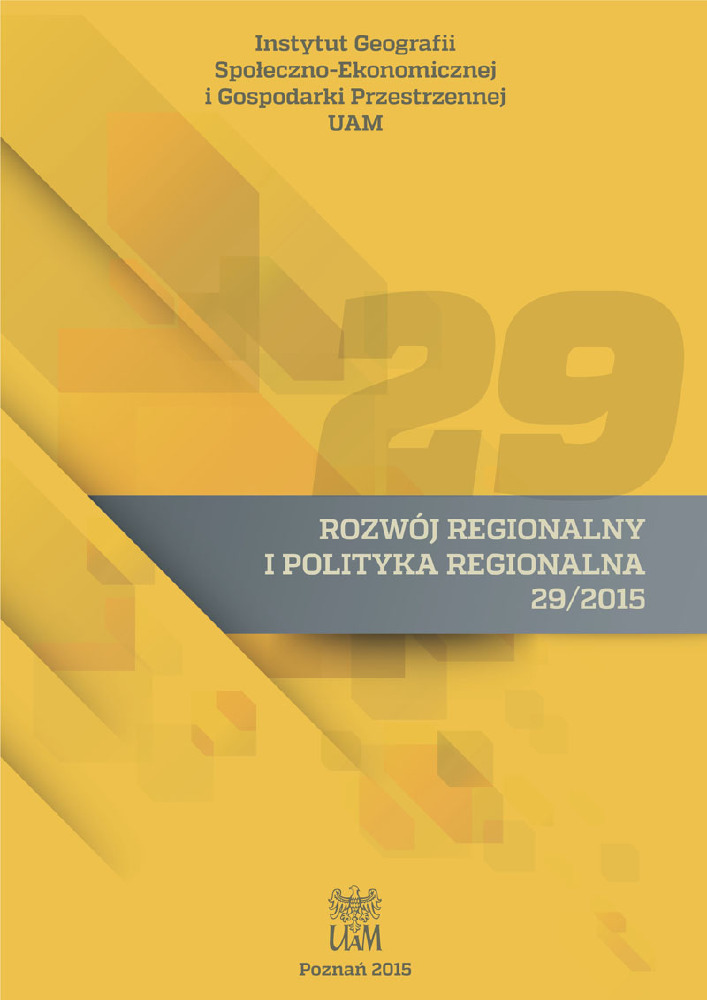Abstract
The paper includes a discussion of the territorially oriented development policy as a currently leading concept of the development which promote inter-municipal cooperation and collaboration with bodies from social and private sector. The focus is on highlighting the importance of taking into account the operating range of inter-municipal partnerships in determining the boundaries of municipal functional areas that play a key role in the implementation of the territorially oriented development policy. In the beginning are presented assumptions of new regional policy developed since the nineties of the twentieth century. This policy, accentuated by the European Union, seeks to promote the competitiveness of areas among others by supporting the cooperation of the different sectors within the urban functional areas. In Poland, along with the development of sub-urbanization is increasing need to coordinate activities within the municipal functional areas. Local government units form an inter- municipal partnerships to coordinate development policy and jointly provide public services. The Government, in accordance with the European Union policy, is developing programs to support the integration of local authorities among others by promoting cooperation between local government units and the delimitation of the boundaries of urban areas for which wants to run specific investment projects. The author proposes that the setting ranges for these interventions take into account the existing partnership between the self-governments in order to benefit existing experience and trust between the representatives of the local authorities. It is important to protect the capital of cooperation, which was built on part of the emerging municipal functional areas. This paper also presents examples of different treatment by the regional authorities existing intermunicipal partnerships in process to launch in Poland integrated territorial investments as part of the European program. Only in some regions were appreciated the importance of the existing efforts made to determine eg. common strategy, development projects and organize joint municipal services.References
Ansell C. Gash A. 2008. Collaborative governance in theory and practice. Journal of Public Administration Research and Theory, 18(4): 543-571.
Chądzyński J., Nowakowska A., Przygodzicki Z. 2007. Region i jego rozwój w w arunkach globalizacji. CeDeWu, Warszawa.
Czyż T. 2009. Koncepcje aglomeracji miejskiej i obszaru metropolitalnego w Polsce, w: Przegląd Geograficzny, 81, 4: 445-459.
Dolnicki B. 2012. Samorząd terytorialny. Wolters Kluwer, Warszawa.
EC 2008. Green Paper on Territorial Cohesion: Turning Territorial Diversity into Strength. Commision of the European Communinities, Brussels.
Florida R. 2005. The world is spiky. Atlantic Monthly, October.
Grosse T.G. 2008. Rozważania o przyszłości polityki spójności Unii Europejskiej. [W:] P. Jakubowska, A. Kukliński, P. Żuber (red.), Problematyka przyszłości regionów. W poszukiwaniu nowego paradygmatu, Ministerstwo Rozwoju Regionalnego, Warszawa.
Hulst R. i in. 2009. Institutional Shifts In Inter-Municipal Service Delivery. An analysis of developments in eight W estern European countries. Public Organization Rev., 9: 263-285.
Hulst R., van Montfort A. 2012. Institutional features of inter-municipal cooperation: Cooperative arrangements and their national contexts, Public Policy and A dministration, 27(2) s. 121-144.
Kisiała W., Stępiński B. 2013. Rola obszarów metropolitalnych w polityce regionalnej i rozwoju regionalnym. Uniwersytet Ekonomiczny w Poznaniu, Poznań.
Komisja Europejska (KE). 2010. EUROPA 2020 Strategia na rzecz inteligentnego i zrównoważonego rozwoju sprzyjającego włączeniu społecznemu. Bruksela.
Koncepcja Przestrzennego Zagospodarowania Kraju 2030 (KPZK 2030). 2012.
Krajowa Strategia Rozwoju Regionalnego 2010-2020 - regiony, miasta i obszary wiejskie” (KSRR 2020). 2010.
Lackowska M. 2009. Why is voluntary co-operation condemned to failure? Reflections on the Polish and German background. Lex Localis, 7: 347-369.
Lisowski A., Grochowski M. 2008. Procesy suburbanizacji, uwarunkowania, formy i konsekwencje. [W:] Ekspertyzy do koncepcji przestrzennego zagospodarowania kraju 2008-2033. T. 1, Ministerstwo Rozwoju Regionalnego, Warszawa.
Markowski T., Marszał T. 2006. Metropolie, obszary metropolitalne, metropolizacja. Problemy i pojęcia podstawowe. KPZK PAN, Warszawa.
MRR 2009. Identyfikacja i delimitacja obszarów problemowych i strategicznej interwencji w Polsce. Wnioski z analiz. Raporty 2009, Ministerstwo Rozwoju Regionalnego Instytut Badań Strukturalnych, Warszawa.
MRR 2013. Zasady uwzględniania wymiaru miejskiego polityki spójności UE, w tym realizacja zintegrowanych inwestycji terytorialnych. Programowanie perspektywy finansowej na lata 2014-2020. Warszawa.
Nowak J.F. 2012. Rozwój form i zakresu w spółpracy jednostek samorządu terytorialnego z partnerami zewnętrznymi. Prace z Gospodarki Przestrzennej, Zeszyty Naukowe, 247. Wydawnictwo Uniwersytetu Ekonomicznego w Poznaniu.
Nowak J.F., Perska A. 2014. Zaangażowanie partnerów samorządowych aglomeracji poznańskiej w budowanie metropolii Poznań. Studia Miejskie, 13. Wydawnictwo Uniwersytetu Opolskiego.
Nowak M.J. 2010. Polityka przestrzenna w polskich obszarach metropolitarnych.
OECD 2009. Regions matter: economic recovery, innovation and sustainable growth.
Olechnicka A., Wojnar K. 2013. Terytorialny wymiar rozwoju Polska z perspektywy badań ESPON. Wydawnictwo Naukowe Scholar.
Piasecki A. 2009. Samorząd terytorialny i wspólnoty lokalne. Wydawnictwo Naukowe PWN, Warszawa.
Przygodzicki Z. 2007. Region i klasyczne teorie jego rozwoju. [W:] Region i jego rozwój w warunkach globalizacji. CeDeWu Warszawa, s. 39-62.
Smętkowski M., Jałowiecki B., Gorzelak G. 2009. Obszary metropolitalne w Polsce: problemy rozwojowe i delimitacja. Raporty i Analizy EUROREG 1.
Smętkowski M. 2013. Miasta jako bieguny wzrostu. [W:] A. Olechnicka, K. Wojnar (red.), Terytorialny wymiar rozwoju. Polska z perspektywy badań ESPON. Wydawnictwo Naukowe Scholar.
Śleszyński P. 2013. Delimitacja miejskich obszarów funkcjonalnych stolic województw. Przegląd Geograficzny, 85, 2: 173-197.
Winiarski B., Winiarska F. 2006. Polityka regionalna. [W:] B. Winiarski (red.), Polityka gospodarcza. Wydawnictwo Naukowe PWN, Warszawa.
License
Copyright
© 2015 IGSEiGP, Uniwersytet im. Adama Mickiewicza w Poznaniu
OPEN ACCESS
